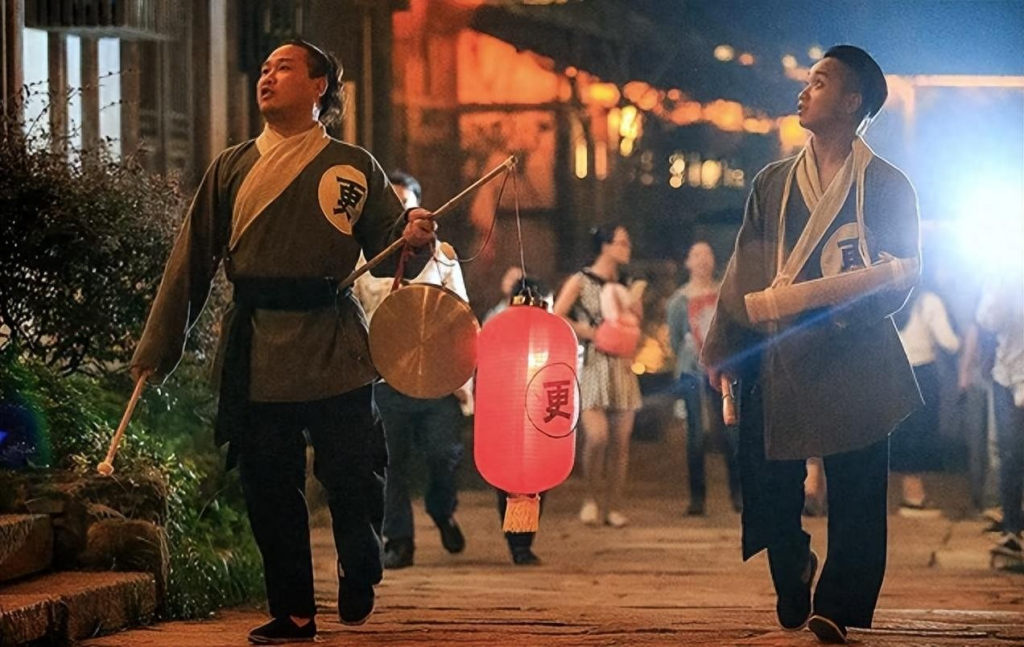Have you ever wondered how people in ancient times managed without alarm clocks, CCTV cameras, or emergency hotlines? Who kept the streets safe when everyone was asleep? If you’ve been watching the historical drama Under the Microscope, you might have noticed the night watchmen patrolling the streets—an often-overlooked but essential profession that reveals the hardcore survival wisdom of ancient people.

Fire Prevention: The Original Firefighters
In today’s world, we worry about break-ins and cybercrime, but back in ancient China, fire was the number one threat. Here’s a shocking fact: the fire-related mortality rate in ancient times was 60 times higher than today! With houses made of wood and paper, one stray ember could turn a neighborhood into an oversized barbecue.
That’s why night watchmen weren’t just guards; they were also early fire alarm systems. Every night, they would walk the streets, shouting warnings like, “The air is dry, be cautious of fire!”—the ancient equivalent of today’s fire safety announcements. Records from the Ming Dynasty’s Chenghua era mention a devastating fire in Hangzhou caused by an overturned oil lamp. The fire could have wiped out an entire district, but thanks to the quick action of the night watchmen, three streets were saved. These watchmen carried bronze gongs to sound the alarm and water pouches for emergency firefighting—essentially walking, talking fire extinguishers.
Crime Prevention: The Ancient Police Force
With no 110 emergency hotline in ancient China, how did people handle thieves and burglars? Enter the night watchmen, who developed an ingenious system called the “segmented patrol method.”
Starting from the first watch (around 7 PM), they patrolled in shifts every two hours, ensuring constant vigilance. But here’s the genius part: they used coded drumbeats to communicate. Three rapid beats? A thief was spotted. Two slow beats? All was well. This primitive form of Morse code kept criminals guessing and on edge.
A Han Dynasty bamboo slip titled The Law on Public Security, discovered at the Sanxingdui site, confirms that catching a thief earned watchmen a monetary reward—a “hero’s bounty” system that existed 2,000 years before modern crime prevention incentives. In Chengdu’s Wuhou Shrine, there’s even an inscription about a night watchman named Zhang who once identified a burglar just by the sound of his footsteps. That’s the kind of super-hearing that would make him a star on The Voice China!
Timekeeping: The Human Alarm Clocks
Think your smartphone alarm is essential? Imagine living in a world where your wake-up call depended on a guy with a wooden clapper! In ancient China, merchants needing to open early, scholars preparing for exams, and officials heading to court all relied on night watchmen’s beats to tell time.
Ming Dynasty scholar Peng Shi almost faced severe punishment for oversleeping before an imperial exam—until he blamed it on the night watchman missing his round. These timekeeping experts used incense clocks and water clocks to ensure accuracy, achieving a margin of error of less than 30 minutes—a remarkable feat in a clockless era.
The Life of a Night Watchman
Becoming a night watchman wasn’t easy. According to Qing Dynasty records, candidates needed endurance to stay awake all night, a strong memory to recall city layouts, and combat skills for self-defense. In Beijing, night watchmen earned a monthly wage equivalent to modern-day 3,000 yuan, but their biggest perk? They were exempt from kneeling before government officials—a prestigious honor, proving they weren’t just night guards but respected figures in society.
Are Watchmen Still Relevant Today?
With modern technology, you might think watchmen are obsolete, but think again. A Japanese study found that Kyoto’s historic districts—where traditional night watch routines are still followed—have 47% lower burglary rates than newer neighborhoods. Even today, luxury gated communities hire security personnel to patrol at night. It seems the ancient wisdom of “human presence over machines” still holds true.
So, the next time you’re scrolling on your phone at 3 AM, spare a thought for the night watchmen of the past, who braved the darkness to keep cities safe. Their rhythmic claps and gongs were the heartbeat of ancient civilization, ensuring that empires thrived and people slept soundly. Without them, could the splendor of the Tang Dynasty’s Chang’an or the Ming Dynasty’s Beijing have shone as brightly? Perhaps we should take a moment to appreciate these unsung heroes—the original guardians of the night.

No comments yet.